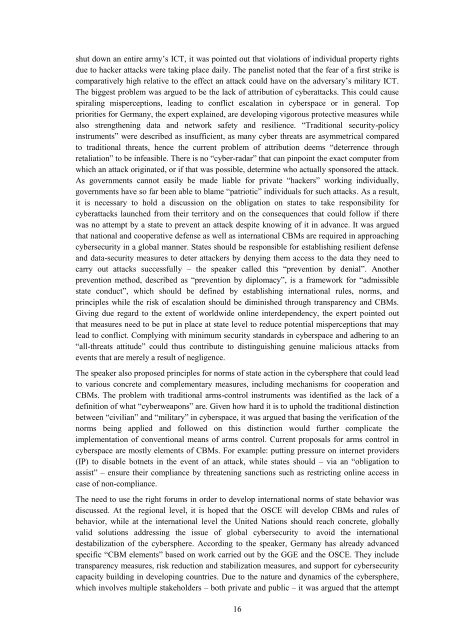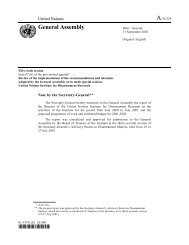Challenges in Cybersecurity Risks, Strategies, and ... - Unidir
Challenges in Cybersecurity Risks, Strategies, and ... - Unidir
Challenges in Cybersecurity Risks, Strategies, and ... - Unidir
You also want an ePaper? Increase the reach of your titles
YUMPU automatically turns print PDFs into web optimized ePapers that Google loves.
shut down an entire army’s ICT, it was po<strong>in</strong>ted out that violations of <strong>in</strong>dividual property rights<br />
due to hacker attacks were tak<strong>in</strong>g place daily. The panelist noted that the fear of a first strike is<br />
comparatively high relative to the effect an attack could have on the adversary’s military ICT.<br />
The biggest problem was argued to be the lack of attribution of cyberattacks. This could cause<br />
spiral<strong>in</strong>g misperceptions, lead<strong>in</strong>g to conflict escalation <strong>in</strong> cyberspace or <strong>in</strong> general. Top<br />
priorities for Germany, the expert expla<strong>in</strong>ed, are develop<strong>in</strong>g vigorous protective measures while<br />
also strengthen<strong>in</strong>g data <strong>and</strong> network safety <strong>and</strong> resilience. “Traditional security-policy<br />
<strong>in</strong>struments” were described as <strong>in</strong>sufficient, as many cyber threats are asymmetrical compared<br />
to traditional threats, hence the current problem of attribution deems “deterrence through<br />
retaliation” to be <strong>in</strong>feasible. There is no “cyber-radar” that can p<strong>in</strong>po<strong>in</strong>t the exact computer from<br />
which an attack orig<strong>in</strong>ated, or if that was possible, determ<strong>in</strong>e who actually sponsored the attack.<br />
As governments cannot easily be made liable for private “hackers” work<strong>in</strong>g <strong>in</strong>dividually,<br />
governments have so far been able to blame “patriotic” <strong>in</strong>dividuals for such attacks. As a result,<br />
it is necessary to hold a discussion on the obligation on states to take responsibility for<br />
cyberattacks launched from their territory <strong>and</strong> on the consequences that could follow if there<br />
was no attempt by a state to prevent an attack despite know<strong>in</strong>g of it <strong>in</strong> advance. It was argued<br />
that national <strong>and</strong> cooperative defense as well as <strong>in</strong>ternational CBMs are required <strong>in</strong> approach<strong>in</strong>g<br />
cybersecurity <strong>in</strong> a global manner. States should be responsible for establish<strong>in</strong>g resilient defense<br />
<strong>and</strong> data-security measures to deter attackers by deny<strong>in</strong>g them access to the data they need to<br />
carry out attacks successfully – the speaker called this “prevention by denial”. Another<br />
prevention method, described as “prevention by diplomacy”, is a framework for “admissible<br />
state conduct”, which should be def<strong>in</strong>ed by establish<strong>in</strong>g <strong>in</strong>ternational rules, norms, <strong>and</strong><br />
pr<strong>in</strong>ciples while the risk of escalation should be dim<strong>in</strong>ished through transparency <strong>and</strong> CBMs.<br />
Giv<strong>in</strong>g due regard to the extent of worldwide onl<strong>in</strong>e <strong>in</strong>terdependency, the expert po<strong>in</strong>ted out<br />
that measures need to be put <strong>in</strong> place at state level to reduce potential misperceptions that may<br />
lead to conflict. Comply<strong>in</strong>g with m<strong>in</strong>imum security st<strong>and</strong>ards <strong>in</strong> cyberspace <strong>and</strong> adher<strong>in</strong>g to an<br />
“all-threats attitude” could thus contribute to dist<strong>in</strong>guish<strong>in</strong>g genu<strong>in</strong>e malicious attacks from<br />
events that are merely a result of negligence.<br />
The speaker also proposed pr<strong>in</strong>ciples for norms of state action <strong>in</strong> the cybersphere that could lead<br />
to various concrete <strong>and</strong> complementary measures, <strong>in</strong>clud<strong>in</strong>g mechanisms for cooperation <strong>and</strong><br />
CBMs. The problem with traditional arms-control <strong>in</strong>struments was identified as the lack of a<br />
def<strong>in</strong>ition of what “cyberweapons” are. Given how hard it is to uphold the traditional dist<strong>in</strong>ction<br />
between “civilian” <strong>and</strong> “military” <strong>in</strong> cyberspace, it was argued that bas<strong>in</strong>g the verification of the<br />
norms be<strong>in</strong>g applied <strong>and</strong> followed on this dist<strong>in</strong>ction would further complicate the<br />
implementation of conventional means of arms control. Current proposals for arms control <strong>in</strong><br />
cyberspace are mostly elements of CBMs. For example: putt<strong>in</strong>g pressure on <strong>in</strong>ternet providers<br />
(IP) to disable botnets <strong>in</strong> the event of an attack, while states should – via an “obligation to<br />
assist” – ensure their compliance by threaten<strong>in</strong>g sanctions such as restrict<strong>in</strong>g onl<strong>in</strong>e access <strong>in</strong><br />
case of non-compliance.<br />
The need to use the right forums <strong>in</strong> order to develop <strong>in</strong>ternational norms of state behavior was<br />
discussed. At the regional level, it is hoped that the OSCE will develop CBMs <strong>and</strong> rules of<br />
behavior, while at the <strong>in</strong>ternational level the United Nations should reach concrete, globally<br />
valid solutions address<strong>in</strong>g the issue of global cybersecurity to avoid the <strong>in</strong>ternational<br />
destabilization of the cybersphere. Accord<strong>in</strong>g to the speaker, Germany has already advanced<br />
specific “CBM elements” based on work carried out by the GGE <strong>and</strong> the OSCE. They <strong>in</strong>clude<br />
transparency measures, risk reduction <strong>and</strong> stabilization measures, <strong>and</strong> support for cybersecurity<br />
capacity build<strong>in</strong>g <strong>in</strong> develop<strong>in</strong>g countries. Due to the nature <strong>and</strong> dynamics of the cybersphere,<br />
which <strong>in</strong>volves multiple stakeholders – both private <strong>and</strong> public – it was argued that the attempt<br />
16








